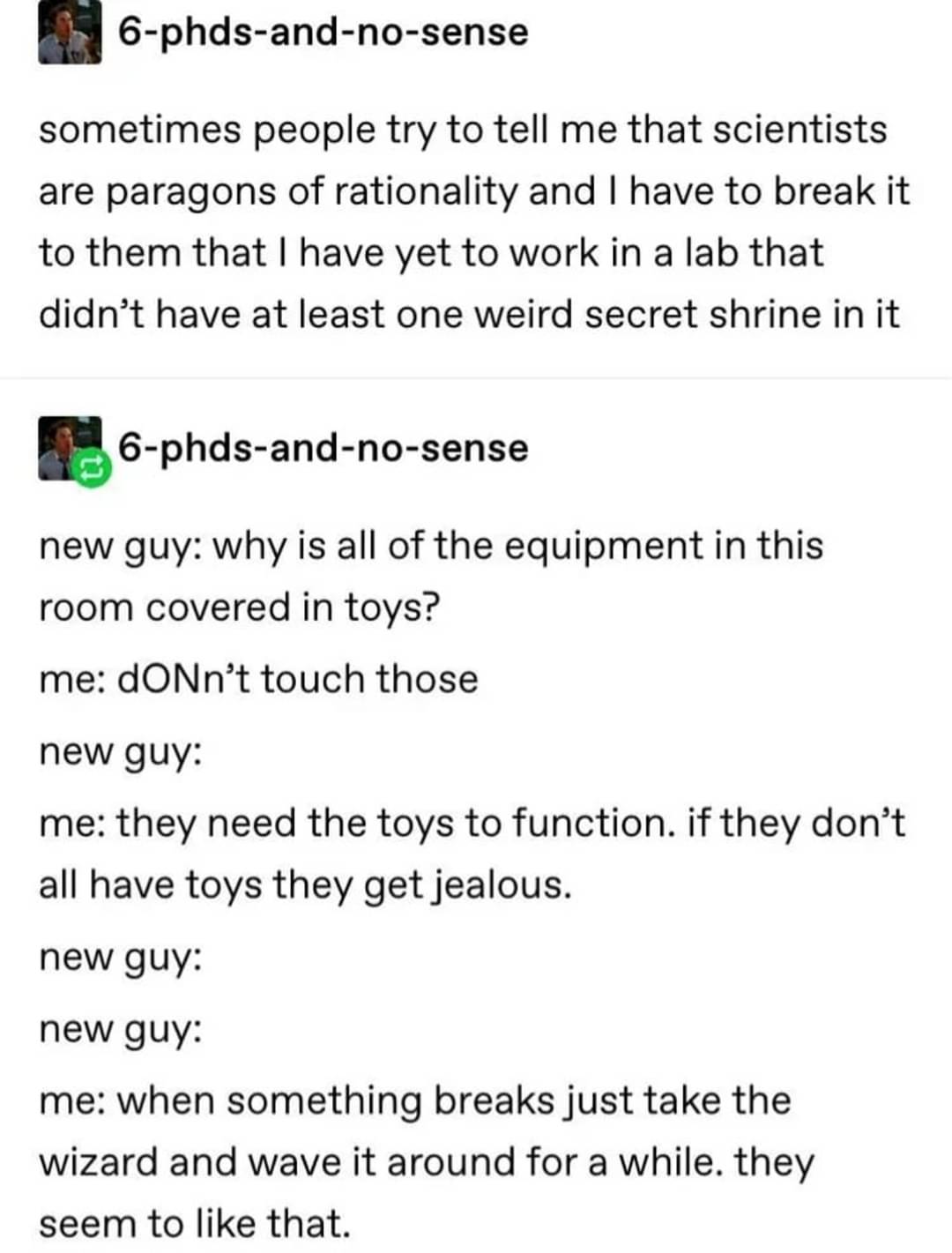this post was submitted on 07 Nov 2024
851 points (98.6% liked)
Science Memes
14408 readers
978 users here now
Welcome to c/science_memes @ Mander.xyz!
A place for majestic STEMLORD peacocking, as well as memes about the realities of working in a lab.

Rules
- Don't throw mud. Behave like an intellectual and remember the human.
- Keep it rooted (on topic).
- No spam.
- Infographics welcome, get schooled.
This is a science community. We use the Dawkins definition of meme.
Research Committee
Other Mander Communities
Science and Research
Biology and Life Sciences
- [email protected]
- [email protected]
- [email protected]
- [email protected]
- [email protected]
- [email protected]
- [email protected]
- [email protected]
- [email protected]
- [email protected]
- [email protected]
- [email protected]
- [email protected]
- [email protected]
- [email protected]
- [email protected]
- [email protected]
- [email protected]
- [email protected]
- [email protected]
- [email protected]
- [email protected]
- [email protected]
- [email protected]
- !reptiles and [email protected]
Physical Sciences
- [email protected]
- [email protected]
- [email protected]
- [email protected]
- [email protected]
- [email protected]
- [email protected]
- [email protected]
- [email protected]
Humanities and Social Sciences
Practical and Applied Sciences
- !exercise-and [email protected]
- [email protected]
- !self [email protected]
- [email protected]
- [email protected]
- [email protected]
Memes
Miscellaneous
founded 2 years ago
MODERATORS
you are viewing a single comment's thread
view the rest of the comments
view the rest of the comments

See also, the Pauli effect: https://en.wikipedia.org/wiki/Pauli_effect
I've wondered if mental state actually affects reality around us. Like some people who see paranormal shit are just more open to it or something while the presence of a skeptic prevents it from happening
And people who just don't have confidence that tech will work can cause random issues just by being present, but sometimes when a tech confident person comes to assist them, their confidence gets it to work properly.
Maybe it has to do with particle/wave duality and the observer effect, and the simulation approximates things more when people aren't paying as much attention or won't likely investigate an issue closely after the fact, so the simulation gets sloppy because it's approximating. But then when someone who will pay closer attention comes (or will come), the waves collapse into particles and it behaves as expected.
Maybe those cases where a user claims something usually works when they do it a way that is clearly wrong to the more experienced observer, the approximation works out in their favour, but the collapse to particles makes it break like it was supposed to the whole time.
Maybe Pauli understood some things about the technical equipment (and ropes?) that the others didn't or was better at calibration and collapsed the wave more than usual.
Though my guess for the chandelier is that someone first thought of the dropping it when he entered joke but then realized that saying they tried to do that and it failed would be even funnier plus save them a chandelier and be much easier and safer to pull off.
Having worked in tech support for a system that I knew very well, I often saw problems vanish when users attempted to demonstrate them with me present
People would say my tech aura made it work
Really though people just take more care when an expert is present, and so avoid whatever error their earlier carelessness caused
I wonder if people who experience the opposite encourage less care among those around them
You might be on to something
Particle don't have anything todo with a person observing it, it collapses if you try to observe it because the only way to observe a particle is launching another particle to it, and that changes the particle state
What if these people are actually bad people and we just can't know why?
Interesting, I seem to have the opposite condition - something breaks, then they ask me to look at it and by the time I get there it's working perfectly again.
Is this a corollary to the Pauli Exclusion Principle?
The article I linked says they're unrelated.
Oh I know, it was sarcasm